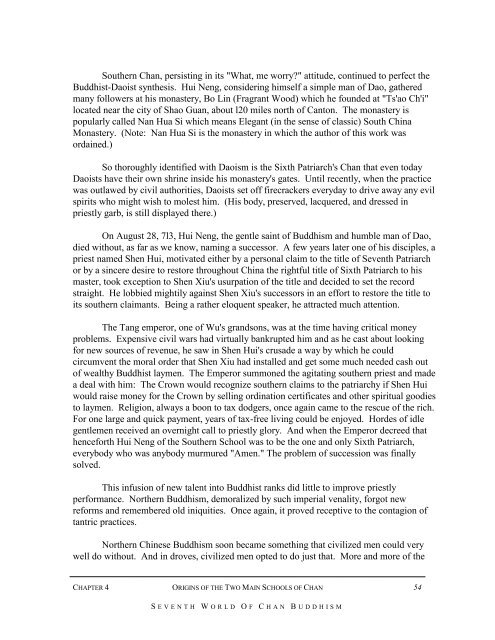seventh world of chan buddhism - Zen Buddhist Order of Hsu Yun
seventh world of chan buddhism - Zen Buddhist Order of Hsu Yun
seventh world of chan buddhism - Zen Buddhist Order of Hsu Yun
Create successful ePaper yourself
Turn your PDF publications into a flip-book with our unique Google optimized e-Paper software.
Southern Chan, persisting in its "What, me worry?" attitude, continued to perfect the<br />
<strong>Buddhist</strong>-Daoist synthesis. Hui Neng, considering himself a simple man <strong>of</strong> Dao, gathered<br />
many followers at his monastery, Bo Lin (Fragrant Wood) which he founded at "Ts'ao Ch'i"<br />
located near the city <strong>of</strong> Shao Guan, about l20 miles north <strong>of</strong> Canton. The monastery is<br />
popularly called Nan Hua Si which means Elegant (in the sense <strong>of</strong> classic) South China<br />
Monastery. (Note: Nan Hua Si is the monastery in which the author <strong>of</strong> this work was<br />
ordained.)<br />
So thoroughly identified with Daoism is the Sixth Patriarch's Chan that even today<br />
Daoists have their own shrine inside his monastery's gates. Until recently, when the practice<br />
was outlawed by civil authorities, Daoists set <strong>of</strong>f firecrackers everyday to drive away any evil<br />
spirits who might wish to molest him. (His body, preserved, lacquered, and dressed in<br />
priestly garb, is still displayed there.)<br />
On August 28, 7l3, Hui Neng, the gentle saint <strong>of</strong> Buddhism and humble man <strong>of</strong> Dao,<br />
died without, as far as we know, naming a successor. A few years later one <strong>of</strong> his disciples, a<br />
priest named Shen Hui, motivated either by a personal claim to the title <strong>of</strong> Seventh Patriarch<br />
or by a sincere desire to restore throughout China the rightful title <strong>of</strong> Sixth Patriarch to his<br />
master, took exception to Shen Xiu's usurpation <strong>of</strong> the title and decided to set the record<br />
straight. He lobbied mightily against Shen Xiu's successors in an effort to restore the title to<br />
its southern claimants. Being a rather eloquent speaker, he attracted much attention.<br />
The Tang emperor, one <strong>of</strong> Wu's grandsons, was at the time having critical money<br />
problems. Expensive civil wars had virtually bankrupted him and as he cast about looking<br />
for new sources <strong>of</strong> revenue, he saw in Shen Hui's crusade a way by which he could<br />
circumvent the moral order that Shen Xiu had installed and get some much needed cash out<br />
<strong>of</strong> wealthy <strong>Buddhist</strong> laymen. The Emperor summoned the agitating southern priest and made<br />
a deal with him: The Crown would recognize southern claims to the patriarchy if Shen Hui<br />
would raise money for the Crown by selling ordination certificates and other spiritual goodies<br />
to laymen. Religion, always a boon to tax dodgers, once again came to the rescue <strong>of</strong> the rich.<br />
For one large and quick payment, years <strong>of</strong> tax-free living could be enjoyed. Hordes <strong>of</strong> idle<br />
gentlemen received an overnight call to priestly glory. And when the Emperor decreed that<br />
henceforth Hui Neng <strong>of</strong> the Southern School was to be the one and only Sixth Patriarch,<br />
everybody who was anybody murmured "Amen." The problem <strong>of</strong> succession was finally<br />
solved.<br />
This infusion <strong>of</strong> new talent into <strong>Buddhist</strong> ranks did little to improve priestly<br />
performance. Northern Buddhism, demoralized by such imperial venality, forgot new<br />
reforms and remembered old iniquities. Once again, it proved receptive to the contagion <strong>of</strong><br />
tantric practices.<br />
Northern Chinese Buddhism soon became something that civilized men could very<br />
well do without. And in droves, civilized men opted to do just that. More and more <strong>of</strong> the<br />
CHAPTER 4 ORIGINS OF THE TWO MAIN SCHOOLS OF CHAN<br />
S EVENTH W ORLD O F C HAN B UDDHISM<br />
54


